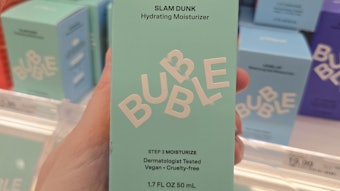A doctoral thesis from the Sahlgrenska Academy, Göteborg University, Sweden, presented the results of a study finding that urine samples, taken from volunteers five days after using a sunscreen containing benzophenone-3, were still found to contain the material—even though subjects had stopped using the sunscreen.
Although benzophenone-3 has been found to provide effective protection against both UVA and UVB radiation, the results of this study suggest that preparations containing the ingredient should not be used on young children since there is limited knowledge about any adverse effects it may cause, other than eczema.
Helena Gonzalez carried out the study in which 26 people applied sunscreen containing 4% benzophenone-3 to the skin, morning and evening, for five days. These subjects supplied a urine specimen each day and continued to provide specimens after ceasing use of the sunscreen. The urine still was found to contain benzophenone-3, five days later, suggesting that the substance is stored in the body. According to the study, the average total amount of benzophenone-3 excreted was 3.7%.
Because it is not yet known how long the material is stored, or whether it is important, Gonzalez suggested that parents of small children avoid using sunscreens that contain benzophenone-3, to be on the safe side. This is because children under the age of two do not yet have fully developed enzymes that are believed to break down benzophenone-3.
For more information about the study, visit the university Web site.









